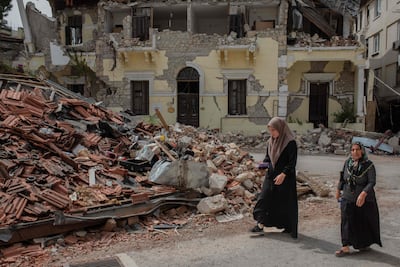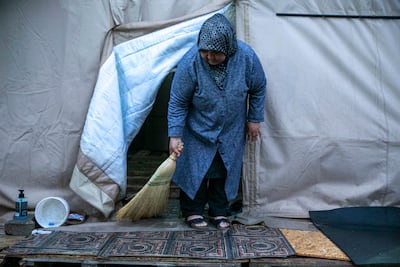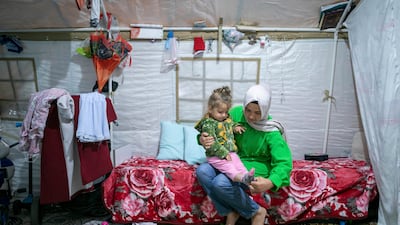Women who were displaced by the earthquake in Turkey have the opportunity to learn how listening to each other can alleviate their suffering and help rebuild their communities as part of a recently launched mental health project.
The 7.8 magnitude earthquake in February killed more than 50,000 people and displaced millions in eastern Turkey and north-west Syria. The British Red Cross says 2.7 million survivors are now living in tents.
Weekly support groups can now provide a safe space for women who lost their homes and members of their family to meet and talk – guided by people trained by experts in trauma therapy.
“I believe in the importance of the community holding spaces for each other and supporting each other,” said Vuslat Dogan Sabanci, an artist and founder of the Vuslat Foundation, the Turkish non-profit group behind the scheme.
“The facilitators will go into the field and hold support groups,” she told The National, at an event in London hosted by the foundation. "It’s not possible to provide one-on-one psychological help, because we’re talking about millions of people."

The aftermath of the earthquake has been described as a "mental health ticking time bomb" by the International Federation of Red Cross and Red Crescent Societies (IFRC).
"The demand for mental health and psychosocial support and health care is immense, and in some areas where access is difficult it can put the most affected at even higher risk of developing medium and long-term mental health challenges that can hinder recovery and resilience," the IFRC said in a statement.
Merve Caglar, Vuslat Foundation's director, said survivors had experienced a profound loss of community, which the support groups will attempt to help restore.
"Their neighbour is not there, or their butcher is no longer alive," she said. "The women lost their families, friends and whole identities. "Healing is not just about healing yourself, but supporting other people to feel useful."
Women who migrated to other parts of the country after the earthquake were also at risk, she added. "When they move from Eastern Turkey to cities like Ankara or Istanbul, the culture is very different," she said.
The project is part of the foundation’s Generous Listening campaign, which aims to encourage tolerance through listening in academia, business, government and communities.
It includes an academic centre at Tufts University in the US sate of Massachusetts, which aims to foster "the art of listening" in areas such as government and conflict resolution.
“We’re working on three pillars: supporting academic research on the impact of listening, raising awareness on generous listening and developing practices and creating spaces for generous listening,” said Ms Sabanci, who previously served at chairwoman of Hurriyet, a leading Turkish newspaper.

The original workshops were devised for the businesses and university campuses. “When the earthquake happened we thought 'forget about the business community. There’s a big trauma back home',” she said.
Ms Sabanci hopes Generous Listening can help people build better connections with each other.
“Connections are missing. That’s why we have depression, that’s why we have social uprisings. We have an environmental crisis, because our we’re disconnected from nature,” she said.
“We have a saying in Turkey – listen to your heart’s ear – and I translated it as Generous Listening."


